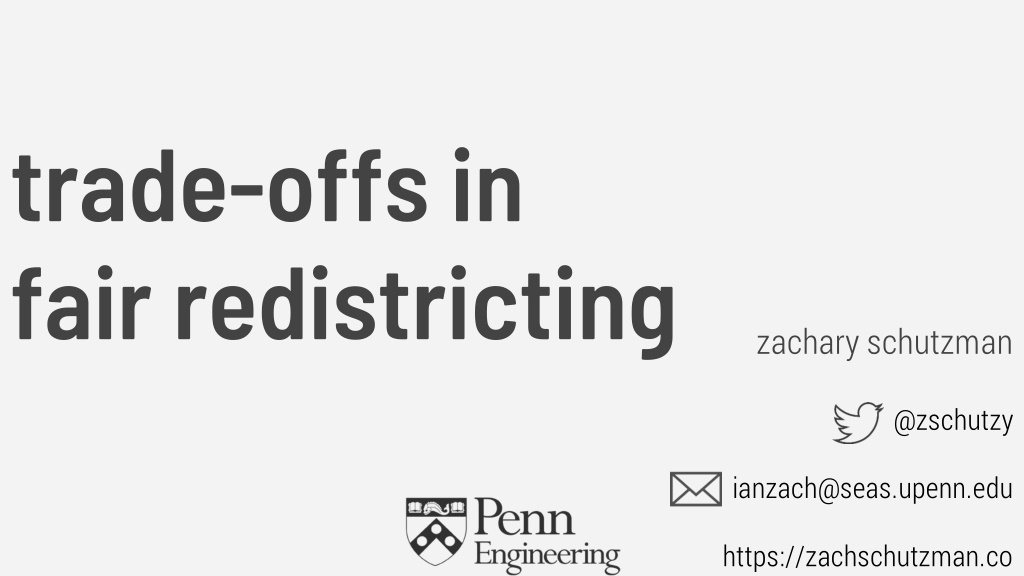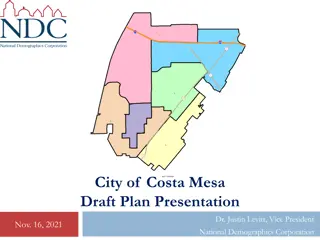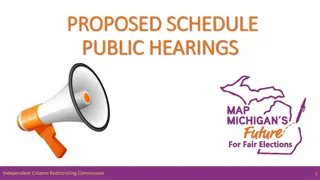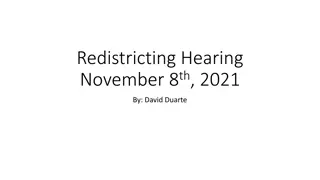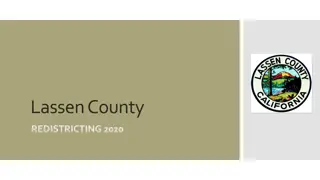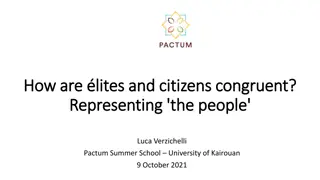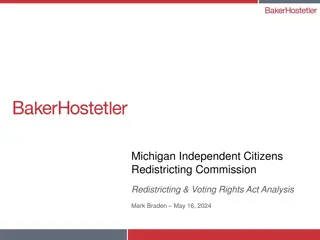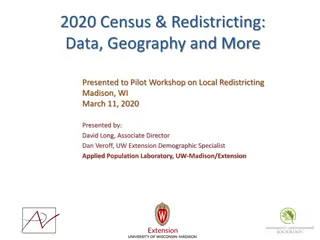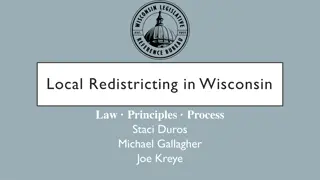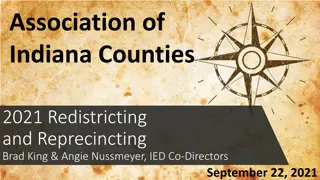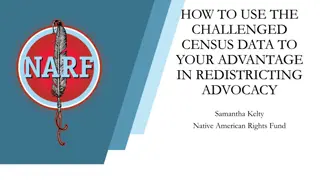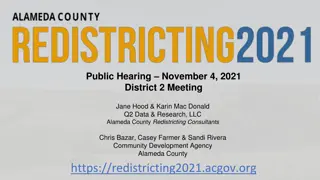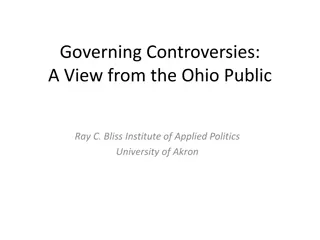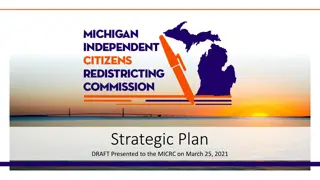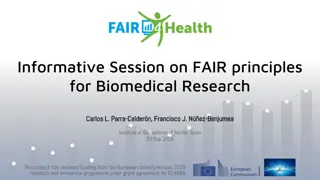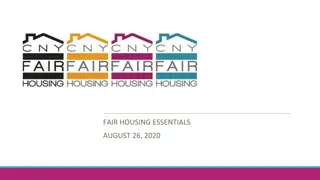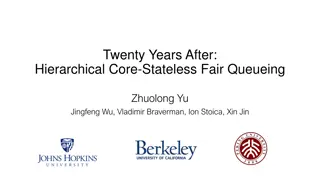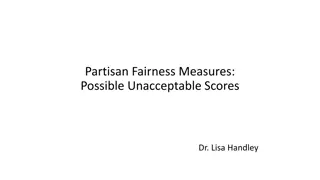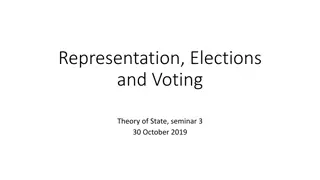The Importance of Fair Redistricting in Political Representation
Redistricting is the process of redrawing electoral boundaries to ensure equal representation and balance in voting systems. It involves various district types like congressional, state legislative, county, judicial, municipal, school board, and more. However, the process is crucial as districts can be manipulated for personal interests leading to unfair outcomes. State legislators drawing their own districts can lead to biased representation. Maintaining fairness and integrity in redistricting is essential for upholding democracy.
Download Presentation

Please find below an Image/Link to download the presentation.
The content on the website is provided AS IS for your information and personal use only. It may not be sold, licensed, or shared on other websites without obtaining consent from the author. Download presentation by click this link. If you encounter any issues during the download, it is possible that the publisher has removed the file from their server.
E N D
Presentation Transcript
trade-offs in fair redistricting zachary schutzman @zschutzy ianzach@seas.upenn.edu https://zachschutzman.co
what is redistricting? periodically, we need to redraw
what is redistricting? congressional districts periodically, we need to redraw
what is redistricting? congressional districts state legislative districts periodically, we need to redraw
what is redistricting? congressional districts state legislative districts county districts periodically, we need to redraw judicial districts municipal districts
what is redistricting? congressional districts state legislative districts county districts periodically, we need to redraw judicial districts municipal districts school board districts school attendance zones
what is redistricting? congressional districts state legislative districts county districts periodically, we need to redraw judicial districts municipal districts school board districts school attendance zones library districts voting precincts emergency services districts ...
what is redistricting? congressional districts state legislative districts county districts periodically, we need to redraw judicial districts districts are often drawn by people with a personal interest in the outcome municipal districts school board districts school attendance zones library districts voting precincts emergency services districts ...
what is redistricting? congressional districts state legislative districts county districts periodically, we need to redraw judicial districts districts are often drawn by people with a personal interest in the outcome municipal districts school board districts - state legislators draw their own districts school attendance zones library districts voting precincts emergency services districts ...
what is redistricting? congressional districts state legislative districts county districts periodically, we need to redraw judicial districts districts are often drawn by people with a personal interest in the outcome municipal districts school board districts - state legislators draw their own districts school attendance zones library districts - draw a school zone so my kid and their friends go to the same school voting precincts emergency services districts ...
history of abuse, but unfairness is judged ad hocand is often hard to articulate
essex county, ma: 1812 state senate districting plan designed to help elbridge gerry s political party
essex county, ma: 1812 state senate districting plan designed to help elbridge gerry s political party this districtis oddly-shaped, advantages one party in particular
tuskegee, al, 1957: state disincorporated black areas of the city
tuskegee, al, 1957: state disincorporated black areas of the city (~80% of the population!)
tuskegee, al, 1957: state disincorporated black areas of the city (~80% of the population!) to prevent participation in municipal government
tuskegee, al, 1957: state disincorporated black areas of the city (~80% of the population!) to prevent participation in municipal government scotus: redrawing city boundaries serves no countervailing municipal function
little rock, arkansas: 2011- 2019 school attendance zone lines
central little rock, arkansas: 2011- 2019 school attendance zone lines hall fair mcclellan
little rock, arkansas: 2011- 2019 school attendance zone lines this plan treats black students systematically worse than white students
This means, in view of the subtle possibilities for favoritism, that the human element must be removed as completely as possible from the redistricting process. In part, this means that the process should be completely mechanical, so that once set up, there is no room at all for human choice. More than this, [...] it should not be possible to predict in any detail the outcome of the process. On the Prevention of Gerrymandering, William Vickrey, 1961
if you can quantify it, you can optimize for it proposed algorithms since the 60s
if you can quantify it, you can optimize for it proposed algorithms since the 60s most minimizing some geometric energy
if you can quantify it, you can optimize for it proposed algorithms since the 60s most minimizing some geometric energy since vieth (2004), a search for a way to quantify partisan unfairness
if you can quantify it, you can optimize for it proposed algorithms since the 60s most minimizing some geometric energy since vieth (2004), a search for a way to quantify partisan unfairness computers caught up in ~2010
neutral process: draw districts in a way that s orthogonal to human interests no (dis)favoritism to parties, groups, communities, or individuals almost always formalized as draw pretty shapes
neutral process: equitable outcome: draw districts in a way that s orthogonal to human interests draw districts which give us a fair outcome no (dis)favoritism to parties, groups, communities, or individuals districts shouldn t systematically (dis)advantage any group, community, or individual almost always formalized as draw pretty shapes very hard to formalize and even harder to remedy, lots of attention currently to partisan (un)fairness
what are the trade-offs between these two frameworks?
neutrality: compactness draw districts to be as nicely-shaped as possible equitable outcome: partisan symmetry answer questions like how different is the seats outcome when republicans get 55% of the vote from when democrats do?
data: pennsylvania and north carolina drawing districts at the precinctlevel use an mcmc package to draw hundreds of thousands of plans evaluate compactness and partisan symmetry
algorithmic redistricting is possible but its value and impacts are not clear
other factors are important but hard to operationalize vra compliance defining and preserving communities-of-interest concordance with other legal constraints
thank you! @zschutzy ianzach@seas.upenn.edu https://zachschutzman.com
